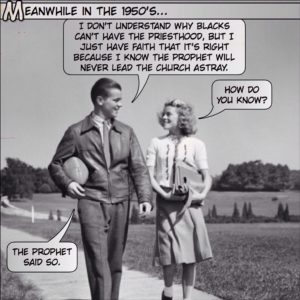Introduction to the Doctrine and Covenants and Church History
It’s a busy year for Your Humble Godless Doctrine teacher. So I’m posting this lesson as kind of a rough outline, with the intention of filling in the details later. Think of this as the notes that a Gospel Doctrine teacher would walk into class with.
Reading assignment
Explanatory Introduction to the Doctrine and Covenants; Doctrine and Covenants 1; introduction to Our Heritage.
Links
Teacher’s manual | Student manual
Overview
This year, we’re rounding out our Gospel Doctrine program with the Doctrine and Covenants.
There are a few themes to keep in mind.
- Joseph Smith wrote the Doctrine and Covenants as a way of manipulating people into doing what he wanted. Hey, that’s one of the things about getting people to think you speak for God. We’re going to keep track of times that “God” tells people to do things for Joseph Smith, or give things to Joseph Smith, or be nice to Joseph Smith.
- It’s possible to go through Sunday School — or even teach Sunday School — and be completely oblivious to what’s going on in these chapters. You just kind of read through it. Then when you find out what it’s really talking about, you slap your forehead. So we’re going to take a look behind the scenes, delving into the history and the Book of Commandments, which was altered to create what we now know as the Doctrine and Covenants. Prepare for forehead slaps.
Reading
Section 1 is a preamble that was attached to the Book of Commandments. It’s the Supreme Leader of the Universe — he’s back with a message for mankind! So what does he do?
Threaten people.
D&C 1:11 Wherefore the voice of the Lord is unto the ends of the earth, that all that will hear may hear:
12 Prepare ye, prepare ye for that which is to come, for the Lord is nigh;
13 And the anger of the Lord is kindled, and his sword is bathed in heaven, and it shall fall upon the inhabitants of the earth.
14 And the arm of the Lord shall be revealed; and the day cometh that they who will not hear the voice of the Lord, neither the voice of his servants, neither give heed to the words of the prophets and apostles, shall be cut off from among the people;
Sin
D&C 1:31 For I the Lord cannot look upon sin with the least degree of allowance;
Apparently, the Lord looked upon Joseph Smith’s adulteries with a great deal of allowance.
Can a prophet ever be wrong?
In our course of study, we’re going to be keeping track of the times when (putative) prophets were wrong, or made predictions that didn’t come true. You’d think this would mean that they’re not prophets, but Mormons are sanguine about prophetic blunders.
Ask: What rationalisations have you heard to excuse prophet fails?
- He spoke as a man.
- Prophets are human.
- The Lord works with them through their imperfections.
Gordon Hinckley once wrote:
“We recognize that our forebears were human. They doubtless made mistakes. . . . There was only one perfect man who ever walked the earth. The Lord has used imperfect people in the process of building his perfect society. If some of them occasionally stumbled, or if their characters may have been slightly flawed in one way or another, the wonder is the greater that they accomplished so much.”
(“The Continuous Pursuit of Truth,” Ensign, April 1986, p. 5)
This is quite something! If a church has a prophet who speaks to God, that would have consequences. But if you ask a Mormon, “What consequences are there for having a prophet?” their answer will be: “Nothing in particular.” It doesn’t mean that the prophet has to get it right. It doesn’t mean they have to have solutions to any problems (least of all the church’s own problems).
And yet, this verse appears in the Doctrine and Covenants:
D&C 1:37 Search these commandments, for they are true and faithful, and the prophecies and promises which are in them shall all be fulfilled.
38 What I the Lord have spoken, I have spoken, and I excuse not myself; and though the heavens and the earth pass away, my word shall not pass away, but shall all be fulfilled, whether by mine own voice or by the voice of my servants, it is the same.
If you say that you are a prophet whose words are the same as those of God, then that means that you don’t get to be wrong. Ever.
Especially when you claim 10 percent of believers’ income, you claim the right to tell people when they get to have sex, and you claim the sealing power over their families.
No. You don’t get to be wrong and then fudge it, claiming you’re still a prophet.


16 January 2017 at 9:16 am
I have left the church and my TBM SO is the gospel doctrine teacher. Thanks for the good conversation starters! Can’t wait to follow
23 January 2017 at 2:39 am
So good to see you back in the saddle!
29 January 2017 at 9:57 pm
Thanks — and I’m sorry the lessons are so fragmentary at this stage.